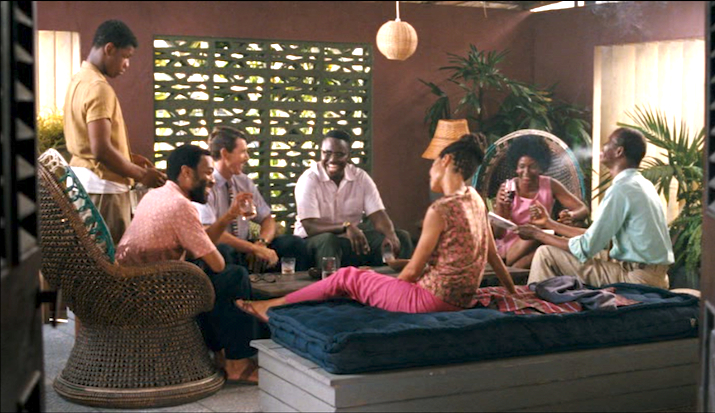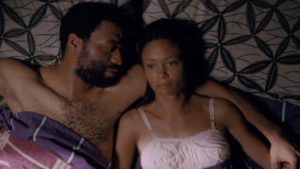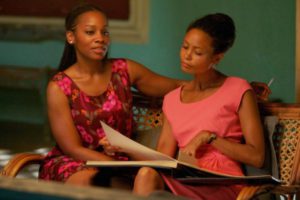IF THE SUN REFUSES TO RISE: A Review of Biyi Bandele’s Half Of A Yellow Sun.
By Didi Cheeka

When a director dies, Flaherty says, he becomes a photographer. Biyi Bandele’s direction of Half Of A Yellow Sun reveal the filmmaker’s conception of film as a purely pictorial medium. It is not. I do not mean, with the opening sentence, an epitaph on the director’s career. Just that his seeming obsession with the look of his film is responsible for the film’s weakness. (It is either an obsession or it’s a diversion from a non-dramatic screenplay.) Here’s Biyi Bandele on his film: “Advice to young filmmakers: beware of being literal. Turning a screenplay into a movie, let alone a work of prose into a screenplay, is an act of translation. For it to come alive in the new language, which is to say, medium, you must avoid – throw away – the crutches of being literal [and safe]. Opt instead for idioms and metaphors inherent to the new language and everything will soar. For this act of impudence, those beings who mistake being literal with being faithful to your source, and who equate being dull with being profound, will excoriate you. Ignore these self-anointed arbiters of taste, these panjandrums of the craft of your trade…” and so on and so forth into the night.
There is, of course, an irresistible pull to visualize works of literature we love. All too often, a problem arises when a work of great artistic value is translated into another medium: much of the greatness associated with the original piece diminishes. It could be that this is merely subjective, in the mind of the audience who subconsciously resists fresh insights and consider their love tainted by the new medium. I do not mean by this that the novel, Half Of A Yellow Sun by Chimamanda Adichie is a great novel. Ms Adichie wrote a good novel. So there was, from the outset, no question of damaging its greatness cinematically. It is possible that Biyi’s love for the novel supersedes that of the literary purist – I want to believe that he got carried away by the love and not commercialism to visualize Adichie’s novel. Similarly, I want to believe it was love and not commerce that informed his choice of Thandie Newton and Anika Noni Rose as Olanna and Kainene.
I must caution, however, against the temptation to sympathize with the filmmaker over the so-called literary purists. Contrary to his retrospective comments about throwing away “the crutches of being literal” Biyi’s interpretation honours its source. In this sense: it’s too literal, it shows his lack of knowledge of cinematic narrative. The narrative shortcoming owes its source to the director’s fidelity to literature. I trust I won’t be mistaken for a “self-anointed arbiter of taste who equate being dull with being profound,” but the thing is – in sequence after sequence – Biyi is so marvellously profound you will seem too dull to understand the narrative if you’ve not read the book. In any case, in what way are you freed as a filmmaker by the “idioms and metaphors inherent to the new language” from meaning, content, quality of performance, character and gaps in the narrative? This review may “excoriate,” but it will not be unfair.
After Olanna decides to move out of Odenigbo’s, following her discovery of his betrayal of her, she asks Ugwu if the academic gathering still holds at the flat (that is, if the normal still goes on). This feeling of normality – normality preparatory to an event – takes away something vital from the setup. The academes are not filmed satirically: in the sense that they engage in abstraction while their society burns. They take themselves a little too serious. And the director takes them at their word. In a way, this abstract, impersonal, dull academic gathering prepares you beforehand: there will be an absence of directorial point of view. It seems to me this absence goes beyond a struggle to master cinematic narrative. It seems to stem from an absence of courage to match directorial vision with the author’s text. But, what works for a novelist may not work for a filmmaker.

In the novel, Adichie handles Olanna’s discovery of Odenigbo’s betrayal rather well. There is a legitimate basis for Olanna’s flash of revelation. In the movie, it comes across as a sudden acquisition of clairvoyant power. To cue the audience Odenigbo suddenly engages in sub-verbal antics which sole purpose seems designed to give himself away to his lover. Is this how a lover conceals infidelity? Beyond this, however, is the question of motive. Why did Odenigbo touch Amala (how come nobody ever called it rape)? Because she is available – female bodies are always available – to be used and discarded? Or is it that it’s in the nature of men to cheat? To put it differently, why is it necessary for us to be shown this sex act? Because the director accepts the characters of Odenigbo and Olanna as given (in the novel) he fails to question their sex life. The sex scene between Odenigbo and Amala, thus, loses its meaning as a need to assert masculinity and power with a female body that is not an academic equal. Instead, we are offered the lame excuse of what drink (and probably the devil disguised as a woman) can lure a man into. It is probably why the director misses the true meaning of Olanna’s betrayal of her sister by sleeping with her lover. Olanna is made to play the scene like a revenge-seeking seductress. No. I disagree. In sleeping with Richard, Olanna is trying to discharge her insecurity, seeking reassurance, validation of her injured womanhood, using sex as a momentary blackout, not as revenge against Odenigbo for his betrayal. The poetry of this scene, just like the poetry of Olanna and Odengbo’s love scenes, come at too cheap a price.
The director obviously does not know how to use the sex in the novel symbolically, to help draw character: Odenigbo could easily impregnate the village Amala but could not do the same with his British-trained wife; Richard could bring Olanna to a screaming orgasm (in the novel) but could not effectively make love to the woman he truly loves, Kainene. Equally strange is the way Kainene deciphers Richard’s betrayal – again discovery and confession work at a sub-verbal level. These two women must be the smartest of women, able to read men’s silences. Again, Biyi makes a strange directorial choice! To throw away the powerful symbolism of Kainene’s burning of Richard’s manuscript out of her hurt over this most painful of betrayal – with her own sister. The scene could have worked on a symbolic level of rejecting the power of someone from another culture to construct a regime of truth about a people by usurping their right to tell their own story. I find Kainene’s quietly hurt (her voice kept just below hysteria) in the novel much more moving than Anika Noni’s loud retort. I’ve always felt Kainene is the one, of the four, who seems genuinely capable of love so I wonder if Biyi couldn’t have found a way to use that really touching love note of hers to Richard.
Quite apart from the sheer egotism of his “Advice to young filmmakers,” this director reveals a stark inability to heed his own advice to “avoid – throw away – the crutches of being literal [and safe]” in his use of archival footage of the Nigerian civil war. (Advice to young filmmakers: mind who you run to for advice.) The war footage intercut the staged sequences as if to compensate for a plot that does not parse. Is Biyi not aware that the italicized semi-reportorial portion is a weakness in the novel – crudely, jarringly, mechanically tacked-on? To visually reproduce this and still talk about the folly of being literal? Obviously, the director feels compelled to provide a war back-drop to a missing love story. But how about making the war a functional part of the narrative by letting the war report come out of transistor radios, intruding into the peoples’ daily struggle to stay alive! Why do you need this war footage, what purpose does it serve? Nobody, of course, stops a filmmaker from adopting the stance of a history teacher, but why not teach without being literal?
Still, on being literal, the times you really wish for the filmmaker to be faithful to the source are the times he’s not. Take the scene after Olanna escapes the killings. She lies in the car, broken by the attack and what she’s just witnessed, apparently injured. We cut to Odenigbo as he harangue Ms Adebayo. In comes a distraught Olanna to intervene and at first you wonder about Odenigbo’s lukewarm response to her because you think she’s just come from her escape. It is only afterwards you realize the director has misguidedly scrambled time and she’s returned to a scene the director chooses not to show. What kind of advice does this filmmaker give himself, who advised removing Kainene’s Biafran military officer – a potential source of conflict in Richard and Kainene’s love? And that grubby fellow who drags Olanna away from the maniac mob? Is that Biyi’s conception of Olanna’s Hausa-Fulani lover, this fleetingly-glimpsed caricature? And really, this is the word. Most, if not all of the film’s characters are caricatures, cardboard cutout.
 To begin with Kainene. There’s a sense I feel even Ms Adichie misses the implication of Kainene’s definition of herself: a woman in 60s Nigeria helming the family business, a feminism that does not proclaim its feminism, which takes itself as natural as patriarchy seeks to proclaim itself. If a lot of male readers are fascinated by Kainene it’s because of a faulty reading of her character – in the sense of her being a fictional creation, so to say. These same males will denounce her in real life, as they recently did Chimamanda herself. But there is a deeper sense that director and actor miss the character: Kainene’s sexuality is masculine, her love for Richard feels, to me, homoerotic. And I say this not in a condemning way. Biyi’s conception and Anika Noni’s characterization of this female are far too limited in range. (Perhaps Chimamanda too does not know what to do with a woman like this post-war and so makes her go missing in the war?) And Olanna? I’m puzzled about how Olanna, whose lover’s indiscretion with Amala caused her to unravel and betray herself and her sister so cruelly, could turn around, after the indiscretion results in pregnancy, and seek to keep the product of this indiscretion. Just before this martyr-like decision, there’s that lingering shot of her before the mirror, after Odenigbo breaks the news of the pregnancy. The blow seems to hurt in her womb, and here, we see that her definition of her sexuality is in line with patriarchy’s definition of female sexuality: in connection with reproduction.
To begin with Kainene. There’s a sense I feel even Ms Adichie misses the implication of Kainene’s definition of herself: a woman in 60s Nigeria helming the family business, a feminism that does not proclaim its feminism, which takes itself as natural as patriarchy seeks to proclaim itself. If a lot of male readers are fascinated by Kainene it’s because of a faulty reading of her character – in the sense of her being a fictional creation, so to say. These same males will denounce her in real life, as they recently did Chimamanda herself. But there is a deeper sense that director and actor miss the character: Kainene’s sexuality is masculine, her love for Richard feels, to me, homoerotic. And I say this not in a condemning way. Biyi’s conception and Anika Noni’s characterization of this female are far too limited in range. (Perhaps Chimamanda too does not know what to do with a woman like this post-war and so makes her go missing in the war?) And Olanna? I’m puzzled about how Olanna, whose lover’s indiscretion with Amala caused her to unravel and betray herself and her sister so cruelly, could turn around, after the indiscretion results in pregnancy, and seek to keep the product of this indiscretion. Just before this martyr-like decision, there’s that lingering shot of her before the mirror, after Odenigbo breaks the news of the pregnancy. The blow seems to hurt in her womb, and here, we see that her definition of her sexuality is in line with patriarchy’s definition of female sexuality: in connection with reproduction.
What informed the choice of actors? How is it possible for a supposedly Nigerian character to pronounce “Kedi” – in the novel a northern Nigerian character’s version of the Igbo word Kedu – as “Ked I?” And what language are the northern Nigerian soldiers who storm the airport speaking? As for Onyeka Onwenu, surely she merely performed her judgment of mother-in-laws. It is possible her standard for them is quite high, so high it over-reaches her emotional depth. It is this that destroys the sense of inevitable doom that ought to hang over the scene where Odenigbo and Olanna leave her behind – at her insistence – to die and be buried where her ancestral roots are. Instead of quiet resignation to fate, what you have is the certainty – because whatever horror there is to the scene functions on an abstract, impersonal level – that when the movie is over she will get up and resume her life as Onyeka Onwenu. And her later scene with Olanna outside the village house? What is one to make of this non-sequitur?
For the most part, the actors’ performances are not memorable in any way. The special effect of exploding bombs calls attention to itself as special effects. The movie does not cohere, it feels so much like a series of vignettes. The unfortunate thing is that the movie might not offer new readers the incentive to pick up the book. Perhaps I need to break off and say this: criticism is not interpretive, in the sense of a Rorschach test, in the sense of however you see a work of art is correct. No. Criticism is analytical. You must bring knowledge, experience, passion, taste, intuition, honesty, creativity. Criticism is an art. It is not infallible. It is not an imposition [of taste].
Finally, what also is missing in the movie is a proper sense of the characters’ arcs – how do they finish their journey from where they began. In the novel (unlike in the film), Odenigbo and Olanna end where they began: Odenigbo’s now-ruined house in Nsukka, with Ms Adebayo of the old academic circle visiting. This, I think, is a more gripping character arc: to go from the idealism of the earlier days to post-war disillusionment. Nothing, for me, captures the depth of this loss of idealism as the scene – missing in the film – where Olanna tries to recapture lines from the now dead poet, Okeoma of their academic gathering. It is Odenigbo who manages to recall the lines: “If the sun refuses to rise, we will make it rise/ Clay pots fired in zeal, they will cool our feet while we climb.”




